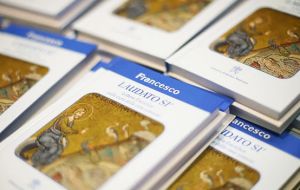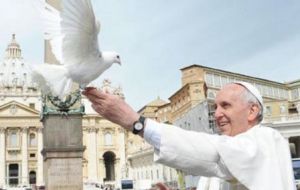MercoPress. South Atlantic News Agency
Francis calls on swift global action to confront environmental degradation
 Francis used the encyclical “Laudato Si” to highlight the crisis posed by climate change and placed most of the blame on fossil fuels and human activity
Francis used the encyclical “Laudato Si” to highlight the crisis posed by climate change and placed most of the blame on fossil fuels and human activity  Francis hopes the encyclical will stir a global movement, with ordinary people pressing politicians for change. Catholics are expected to discuss it on Sunday.
Francis hopes the encyclical will stir a global movement, with ordinary people pressing politicians for change. Catholics are expected to discuss it on Sunday. Argentine Pope Francis called on Thursday for a radical transformation of politics, economics and individual lifestyles to confront environmental degradation and climate change, blending a biting critique of consumerism and irresponsible development with a plea for swift and unified global action.
The vision that Francis outlined in a 184-page papal encyclical is sweeping in ambition and scope: he described relentless exploitation and destruction of the environment and said apathy, the reckless pursuit of profits, excessive faith in technology and political shortsightedness were to blame.
The most vulnerable victims, he declared, are the world’s poorest people, who are being dislocated and disregarded.
Francis used the encyclical — titled “Laudato Si’,” or “Praise Be to You” — to highlight the crisis posed by climate change. He placed most of the blame on fossil fuels and human activity, while warning of an “unprecedented destruction of ecosystems, with serious consequence for all of us” if corrective action is not taken swiftly. Developed, industrialized countries were mostly responsible, he said, and are obligated to help poorer nations confront the crisis.
“Climate change is a global problem with grave implications: environmental, social, economic, political and for the distribution of goods” he wrote. “It represents one of the principal challenges facing humanity in our day.”
“Humanity is faced with a crucial challenge that requires the development of adequate policies, which, moreover, are currently being discussed on the global agenda,” Cardinal Peter Turkson said at a news conference at the Vatican. “Certainly, ‘Laudato Si’ ’ can and must have an impact on important and urgent decisions to be made in this area.”
Francis has made clear that he hopes the encyclical will influence energy and economic policy and stir a global movement. He calls on ordinary people to press politicians for change. Catholic bishops and priests around the world are expected to discuss the encyclical in services on Sunday. But Francis is also reaching for a wider audience, asking in the document “to address every person living on this planet.”
The pope’s stance against environmental destruction and his demand for global action had already thrilled many scientists before the encyclical. Advocates of policies to combat climate change have said they hoped Francis could lend a “moral dimension” to the debate.
Within the scientific community, there is almost a code of honor that you will never transgress the red line between pure analysis and moral issues,” said Hans Joachim Schellnhuber, founder and chairman of the Potsdam Institute for Climate Impact Research. “But we are now in a situation where we have to think about the consequences of our insight for society.”
Francis has been sharply criticized by those who question or deny the established science of human-caused climate change, and also by some conservative Roman Catholics, who saw the encyclical as an attack on capitalism and as political meddling.
Governments are now developing domestic climate-change plans to prepare for a United Nations summit on the issue in Paris in December. The meeting’s goal is to achieve a sweeping accord in which every nation would commit to new policies to limit greenhouse-gas emissions. Many governments have yet to present plans, including major emitters like Brazil, which has a large Catholic population. The encyclical is seen as an unsubtle nudge for action.




Top Comments
Disclaimer & comment rules-

-

-

Read all commentsHow dare the person leading this organisation lecture the rest of us about environmental degradation whilst telling his followers NOT to practice birth control! There are too many of us mucking up the planet already, and WE are the problem.
Jun 20th, 2015 - 06:58 am 0What an ace dumbo!
@ 1 Spot on.
Jun 20th, 2015 - 11:44 am 0China has bought a third of Ecuador's rainforest.
Jun 20th, 2015 - 10:14 pm 0Commenting for this story is now closed.
If you have a Facebook account, become a fan and comment on our Facebook Page!